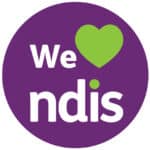At To the Moon and Back, we work alongside children, young people, and adults to provide supports that promote growth, connection, and independence. Our team offers positive behaviour support, as well as therapeutic and early childhood interventions.
Whether it’s developing everyday living skills, supporting positive behaviour change, building confidence at work, or helping families navigate the early years, our approach is collaborative, respectful, and person-led.
Our services are NDIS-funded and delivered with integrity, excellence, and care because we believe that every person deserves the opportunity to live a life of meaning, safety, and joy.
Positive Behaviour Support (PBS) is a compassionate, evidence-based approach used to improve quality of life and to reduce behaviours of concern.

Evidence-based therapy and skill-building for children, adolescents, and adults. Includes skill assessments, emotional regulation, daily living skills, and communication supports.
Please note: availability depends on your NDIS plan. We’ll review your funding with you to ensure we can provide supports that fit your plan’s structure.

Collaborative early intervention for children aged 0–7 years and their families. Focus on play, communication, and participation in everyday routines.
Please note: availability depends on your NDIS plan. We’ll review your funding with you to ensure we can provide supports that fit your plan’s structure.

Comprehensive Behaviour Support Plans developed by registered Behaviour Support Practitioners. Includes Functional Behaviour Assessments, staff training, and restrictive practice reduction strategies. Implementation, monitoring, and review of existing Behaviour Support Plans. Coaching for families, support workers, and services to embed positive behaviour support strategies.
Access to this funding requires a registered Behaviour Support Practitioner and an NDIS-registered provider approved for Improved Relationships.
If your plan doesn’t currently include this funding, we’ll help you explore your options and next steps
If you would like to refer yourself or another participant, please contact our partners directly. We can accept referrals from participants, support coordinators, or plan nominees. We’ll review your referral to make sure our team is the right fit for your goals. If another provider could better meet your needs, we’ll help you connect with them.
Our team will conduct a referral screener to identify your support needs and circumstances. If we believe your goals would be better supported by another service or team, we’ll talk with you openly and help connect you to the right provider. Our aim is always to make sure you receive the support that best fits your needs, even if that means referring you elsewhere.
This process helps us keep everyone safe, uphold choice and control, and make sure you start your journey with a team that understands and values you.
Recognising the need for support can often be the first step towards positive change for your family. If you’ve noticed patterns in your child’s behaviour that disrupt daily life, learning, or interaction with others, then it might be time to consider professional support.
Positive Behaviour Support isn’t just for addressing challenges; it can help you to learn how to capitalise on their strengths and nurture potential. PBS empowers your child with the skills they need to thrive and provides your family with tools for support and understanding. Our behaviour support practitioners are here to guide you through an assessment process to determine if our programs can benefit your child.

